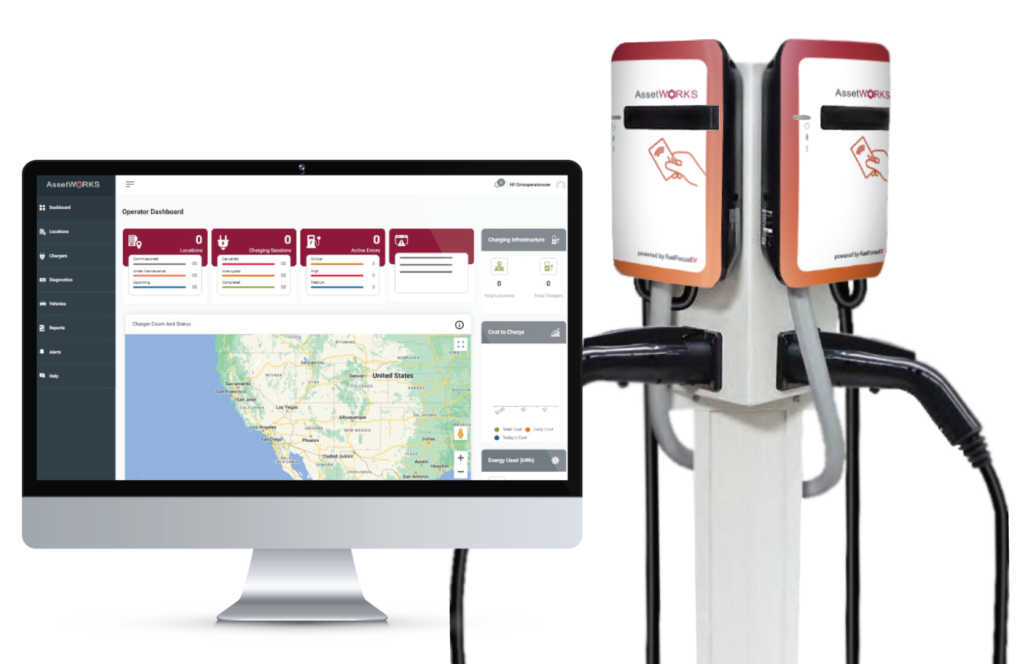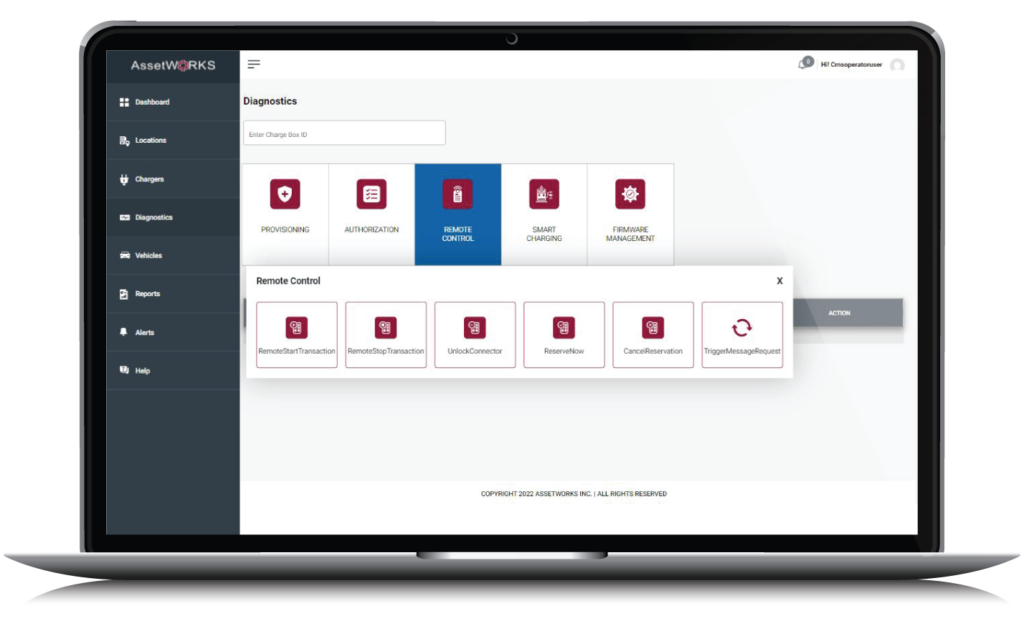Charge management software is a crucial tool as it can further optimize the operations of an electric fleet. Fleet charging software plays a central role in efficiently managing the charging and discharging of EV batteries. Charge management software allows fleet managers to schedule and coordinate charging sessions, guaranteeing vehicles are ready for use when needed.
Charge management software also accounts for factors like energy cost, grid demand, and renewable energy availability to minimize charging expenses and reduce environmental impact. By intelligently balancing the charging load, charge management software can prevent overloads and ensure a stable and cost-effective power supply for the entire fleet. EV charging management is a component of achieving smooth and sustainable electric fleet operations.
Understanding the Need for Charge Management Software
The adoption of EVs in government and public fleets has been steadily increasing in recent years. The shift to EVs results from a worldwide goal to reduce carbon emissions and operational costs. Government fleets are increasingly incorporating EVs into their fleets as a part of their sustainability initiatives.
Fleets across all industries have recognized EVs as a solution to achieving environmental goals while saving on fuel and maintenance expenses- which is why private fleets have also implemented EVs into operations. No matter the industry, organizations are attracted to lower operating costs, reduced reliance on fossil fuels, and the positive image of green transportation choices. The availability of electric vehicle models with improved performance and longer ranges has made the transition more feasible and appealing to fleet managers.
Despite the urge to incorporate EVs into operations, fleet managers remain hesitant to implement the new technology for a few common reasons:
- Infrastructure Funding & Placement
Organizations must have complete visibility into their finances to ensure they have sufficient funding and strategically place chargers to minimize downtime, enhance efficiency, and keep vehicles on the road. - Charging Range
Managers may have concerns about planning routes and schedules with the limited ranges of some EVs, especially in the case of heavy-duty and long-haul vehicles. Utilizing charge management software with integrative telematics solutions helps monitor vehicle charges in real time and schedule optimal routes. - Electric Vehicle Costs
EVs often have higher upfront costs, which may cause managers to feel concerned about budget constraints for fleet acquisition. However, lower operating and maintenance costs can offset this over time. - Specialized Training
EVs are a new technology for everyone- which means managers need to plan for specialized training and maintenance expertise. EVs require less time in the shop, but technicians must train for an EV’s unique technical requirements and maintenance procedures. - EV Fleet Optimization
Fleet managers may have concerns about tracking and EV fleet optimization. Integrating charge management software with fleet management software allows fleets to complete data analysis tools to ensure their electric fleet operates optimally.

Key Features and Benefits of Charge Management Software
EV fleet charging solutions help fleets manage their EV charging infrastructure. Charge software offers a range of features to streamline operations, optimize usage, and ensure a seamless charging experience for users. Features fleets need from their charge management software include:
- Charge Station Monitoring
Real-time monitoring to monitor charging status, vehicle availability, and vehicle performance. Along with notifications when issues arise that could lead to downtime or malfunctions. - Reservation and Scheduling
Booking and reservation capabilities so users can reserve charging stations in advance and prevent overuse. - Load Balancing
Load management to guarantee an even power distribution among multiple charging stations, avoiding grid overload and demand response integration to adjust charging rates during peak demand periods. - Reporting and Analytics
EV charging analytics include reports so fleets can track energy consumption, user behavior, and charging station performance. - Scalability and Multi-Location Support
Ability to manage multiple charging stations at different locations from a centralized dashboard. - Charge Scheduling
Ensures efficient allocation of charging resources, minimizing downtime and cost by strategically planning when and how vehicles get charged, resulting in increased fleet availability and reduced operational expenses.
These features may vary among EV fleet charging solutions, and organizations can choose the ones that best suit their needs and goals. Whether organizations are running a public charging network, managing an EV fleet, or operating charging stations for employees, charge management software can streamline operations and enhance the EV charging experience for users.
Government and Business Fleet Charging Solutions
Charge management software addresses several key challenges that government and business fleets face could face when managing EVs:
1. Optimizes Charging Schedules
Fleets can efficiently allocate charging resources, reducing downtime, and ensuring vehicles are ready when needed. This scheduling capability helps minimize the disruption of fleet operations, a critical concern with business fleet charging as businesses rely on their vehicles for daily operations.
2. Real-Time Monitoring and Alerts
The software ensures fleet managers can quickly identify and address any issues with charging stations. This proactive approach helps prevent costly downtime and offers a reliable and uninterrupted government fleet charging experience.
3. Advanced Billing and Reporting
Fleets can accurately track energy consumption and billing for cost control and budgeting. It also provides detailed usage reports and EV charging analytics of business fleet charging, allowing fleet managers to make data-driven decisions for EV fleet optimizations and identify areas for improvement.
4. Load Balancing and Demand Response
Load balancing helps with business fleet charging by managing electricity consumption efficiently. It prevents government fleet charging from overloading the grid during peak periods and supports grid-friendly charging practices, potentially leading to cost savings and better alignment with sustainability goals.
5. Report Control and Maintenance
Fleet operators can configure and troubleshoot charging stations without physical intervention. This feature streamlines maintenance reduces operational disruptions and enhances the overall reliability of the charging infrastructure.
Charge management software addresses fleet challenges by offering scheduling, monitoring, billing, load management, remote control, and sustainability features, providing fleet operators with the tools they need to optimize their government fleet charging, reduce costs, and enhance the efficiency and reliability of their EV fleets.

Energy Efficiency and Cost Optimization
Energy cost optimization is crucial in sustainable fleet management as it directly impacts a significant portion of operational expenses. By strategically managing and minimizing the cost of charging electric vehicles, fleets can increase cost-effectiveness, maximize profitability, and maintain competitive advantages. Energy cost optimization aligns with sustainability goals, reducing the environmental footprint of fleet operations and contributing to a greener and more socially responsible image for the organization.
Charge management software can help with sustainable fleet management by reducing energy costs in fleet operations through various means:
- Optimizes Charging Schedules
Fleets can take advantage of off-peak electricity rates, which are typically lower, reducing overall energy costs. - Load Management Ability
Ensures charging gets distributed evenly to avoid peak demand charges and associated cost spikes. - Demand Response
Adjusts charging rates during peak periods, further reducing energy expenses. - Energy Consumption Data and EV Charging Analytics
Enables fleets to identify inefficiencies and implement measures to reduce energy waste, ultimately lowering operational costs.
Smart Grid Integration and Demand Response Solutions
Smart grid integration optimizes electric vehicle charge management and elevates the efficiency and sustainability of EV charging infrastructure. This integration empowers charge management software to communicate with the grid, enabling effective demand-side management. Smart grid integration not only prevents grid overloads but also optimizes energy usage during peak periods. Furthermore, smart grid integration facilitates the implementation of time-of-use pricing, empowering users to capitalize on lower electricity rates during off-peak hours- reducing charging costs, and fostering eco-friendly charging practices.
For fleet operations, demand response solutions provide invaluable flexibility in adapting charging rates in real-time, responding to grid conditions and utility pricing. By leveraging demand response solutions, fleet operators can strategically lower electricity rates during off-peak hours, reducing energy costs. Beyond cost savings, demand response solutions enable fleets to align with grid-friendly practices, contributing to overall grid stability and sustainability.
Data Analytics and Performance Monitoring
EV fleet charging solutions offers robust EV charging analytics and charge point monitoring by continuously tracking and collecting data on various aspects of the charging infrastructure. It monitors the status and availability of charging stations, providing fleet managers with insights into station utilization and performance.
Having EV charging analytics on usage reports and energy consumption data allows operators to track patterns, identify inefficiencies, and make data-driven decisions for optimizing charging operations. Charge management software often includes visualization tools, charts, and customizable dashboards that enable fleet managers to analyze the data, set performance benchmarks, and effectively manage their electric vehicle charging infrastructure.
Data-driven decisions are crucial for charge point monitoring. Fleets can optimize operations, reduce costs, and enhance efficiency. Analyzing data related to charging patterns, energy consumption, and vehicle usage allows fleet operators to make informed decisions on scheduling, maintenance, and resource allocation, ultimately improving EV fleet performance. Data-driven decisions support sustainability efforts, ensuring electric fleets operate sustainably and helping fleets meet regulatory and corporate sustainability goals.

Fleet Electrification Strategy and Load Management
A fleet electrification strategy provides a roadmap for the transition to EVs and ensures the adoption process is well-structured and efficient. Properly preparing for fleet electrification helps set concrete goals, establish budgets, and identify the EV models and charging infrastructure for their specific needs, ultimately reducing the risk of unexpected costs and operational disruptions. A well-defined fleet electrician strategy can go further to ensure proper funding, grants, and incentives are secured– making the transition to electric fleets more financially viable.
Load management software plays a major role in supporting electrification efforts by ensuring efficient and sustainable integration of EVs into fleets. The software helps avoid grid overload by distributing power among charging stations, preventing excessive strain on the electrical grid, and minimizing the risk of power disruptions. Load management software is most important when multiple EVs are charging, as it helps reduce energy consumption during peak hours, allowing organizations to take advantage of lower electricity rates.
Environmental Benefits and Green Fleet Management
Green fleet management offers several benefits, some of which contribute to a cleaner and more sustainable transportation ecosystem. Here are some of the key advantages:
- Reduced Greenhouse Gas Emissions
EVs produce zero tailpipe emissions- significantly reducing greenhouse gas emissions compared to ICE vehicles. - Lower Air Pollution
Electric fleets help reduce air pollution in urban areas, leading to better public health by decreasing the release of harmful pollutants such as nitrogen oxides and particulate matter. - Energy Efficiency
EVs are more energy-efficient than ICE vehicles. They convert a higher percentage of the energy from the power grid into vehicle movement, leading to lower energy consumption and reduced strain on energy resources. - Promotion of Renewable Energy
Electric fleets can be charged with electricity from renewable sources such as wind, solar, and hydroelectric power, decreasing their environmental impact and supporting the transition to cleaner energy sources. - Reduced Oil Dependence
Electric fleets reduce dependence on fossil fuels, helping to enhance energy security and reduce the environmental impact of oil extraction, transportation, and refining. - Long-Term Sustainability
EVs have longer lifespans and lower maintenance requirements than ICE vehicles, meaning fewer resources are used over the vehicle’s lifetime, reducing the environmental footprint associated with manufacturing and disposal.
With green fleet management, electric fleets can see multiple environmental benefits that align with global efforts to combat climate change, reduce pollution, and create a more sustainable and environmentally friendly transportation system.
Electric vehicle charge management is integral to green fleet management as it optimizes EV charging infrastructure. With charge scheduling software, fleets can charge during off-peak hours and integrate renewable energy sources. Charge management software also supports energy efficiency and grid stability, aligning with sustainability goals and promoting clean transportation solutions.

Scalability and Future-Proofing
Charge management software is highly scalable, making it well-suited for growing fleets. It allows fleets to create charging station networks and accommodate additional EVs as their fleet expands. This flexibility ensures that fleets remain future-proof and can meet the growing demand for EVs within their operations.
Electric vehicle charge management can further future-proof fleet operations by ensuring charge infrastructure reliability. Charge infrastructure reliability means the infrastructure is adaptable to emerging electric vehicle technologies and industry standards. It allows fleets to seamlessly integrate new charging stations, technologies, and protocols as they evolve, reducing the risk of obsolescence. With the right tools, fleets do not have to worry about remaining efficient and can feel secure as the transportation landscape develops.
Future of Charge Management Software
Charge management software is essential for electric fleets as it optimizes charging infrastructure, enabling efficient use of resources and reducing operational costs. It provides real-time monitoring and control, ensuring the reliability and availability of charging stations, which is critical for fleet operations.
Charge management software supports sustainability by promoting renewable energy use, minimizing greenhouse gas emissions, and improving air quality. Its scalability and adaptability are future-proof electric fleets, ensuring they can evolve with emerging technologies and industry standards, making charge management software a cornerstone for successful, cost-effective, and environmentally responsible fleet operations.
Explore the benefits of charge management software for your fleet by contacting us today. Our solutions can optimize your fleet’s EV operations, reduce costs, and enhance sustainability, providing a competitive edge in the ever-evolving transportation landscape.
Additional Resources
Everything You Need to Know About Federal EV Funding
Top Benefits of Charge Management Software
How to Electrify Your Motor Pool
What Are the Advantages of an EV Fleet?
How EVs Will Change the Way Your Technicians Work
Power Struggles in EV Fleet Management
Are EVs the Solution to Rising Gas Prices?
Understanding EV Load Management for the Fleet Industry












